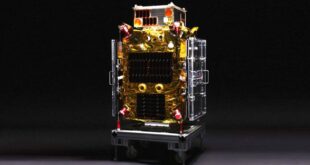
The First Deputy Prime Minister of Kazakhstan, Askar Mamin, has discussed the implementation of the joint Baiterek project in Moscow with the Director General of the Roscosmos State Corporation for Space Activities, Dmitry Rogozin, the press service of the Prime Minister of Kazakhstan said in a statement on 17 September 2018, according to a TASS report.
“During the meeting, the sides exchanged views on topical issues of bilateral cooperation and prospects for further development of the Baikonur complex, discussed the implementation of the joint Kazakh-Russian Baiterek project,” said the press statement.
Baiterek is a Russian-Kazakh commercial space launch development programme that involves building an entirely new launch pad and associated infrastructure at the Baikonur Cosmodrome. Russia is developing the Soyuz-5 medium lift launch vehicle while Kazakhstan will maintain and operate the launch facility. KazCosmos, the Kazakh national space agency, is thought to have earmarked U.S.$314 million to Baiterek, while some projections indicate that each Soyuz 5 launch will cost U.S.$55 million. Soyuz-5 launch operations at the Baiterek pad are scheduled to start in 2024.
The Russian-Kazakh meeting, held on 15 September 2018, also involved other discussions on the commercial development of the Baikonur Cosmodrome.
“Currently, the issues of creating a special economic zone in the city of Baikonur in order to attract investment, are being worked out,” the press statement said.
The Baikonur Cosmodrome is located in the steppes of Kazakhstan, but is operated by Russia under a lease that expires in 2050. Other than the creation of a Special Economic Zone at Baikonur, other commercial developments taking place there include the construction of a facility for the testing and integration of OneWeb satellites before they are mated on to Russian satellite launch vehicles.
In addition, Mamin and Rogozin discussed “the prospects of cooperation for joint creation of space communication satellites,” although further details of this proposed cooperative effort were not available at the time of publication.
 SpaceWatch.Global An independent perspective on space
SpaceWatch.Global An independent perspective on space




